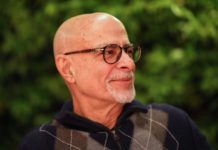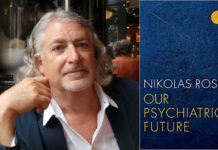Trauma and Mental Health in Social Movements: An Interview with Janice Haaken
MIA's Emaline Friedman interviews psychologist and filmmaker Janice Haaken about how mental health discourse impacts social movements.
The Nurtured Heart Approach Instead of Drugs: An Interview with Howard Glasser
This episode of “Mad in the Family” focuses on a non-drug method to bringing out the best in challenging children, particularly those diagnosed with “ADHD.” It is called the Nurtured Heart Approach® and its essence is that, in the words of our guest, “the same intensity that drives people crazy is actually the source of a child’s greatness."
Psychiatry and the Counterculture: An Interview with Health Historian Lucas Richert
Richard Sears interviews pharmaceutical industry scholar Lucas Richert about American counterculture and psychiatry in the 1970s.
Fascist Subjectivity and the Subhuman: An Interview with Critical Psychologist Thomas Teo
MIA's Tim Beck interviews critical psychologist Thomas Teo on how theory and research can do justice to the people it means to describe and explain.
Psychosocial Disability Rights and Digital Mental Health: An Interview with Piers Gooding
MIA's Emaline Friedman interviews legal scholar Piers Gooding on his work on disability rights and digital mental health technologies.
Rethinking Suicide Prevention: An Interview on Critical Suicide Studies with Jennifer White
MIA’s Samantha Lilly interviews critical youth suicidologist Jennifer White about what suicide prevention could look like outside of the medical model.
How Culture Influences Voice Hearing: An Interview with Stanford Anthropologist Tanya Luhrmann
Ayurdhi Dhar interviews Tanya Luhrmann about cultural differences in voice-hearing, diagnosis and damaged identities, and conflicts in psychiatry.
Surviving Antidepressants: An Interview with Adele Framer
That is the truth about withdrawal syndrome: It’s like a 50-50 chance that you’re going to have a problem. If you’re in the unlucky half, you’re gonna be really unlucky.
Can We Move Toward Mindful Medicine? An Interview with Integrative Psychiatrist Natalie Campo
MIA's Madison Natarajan interviews Natalie Campo about integrative psychiatry and holistic approaches to drug tapering and withdrawal.
Leading Psychology in Existential Times: An Interview with Kirk Schneider
MIA’s Justin Karter interviews humanistic-existential psychologist Kirk Schneider about how psychology can play a role in confronting the political, social, and climate crises facing humankind.
“I Found My Lion’s Roar”: Ro Speight on Combining Peer Support and Open Dialogue
MIA's Ana Florence interviews recovery advocate Ro Speight about her journey from receiving Peer Support to working as a facilitator in Peer Partnered Open Dialogue.
Stuart Shipko – SSRI Withdrawal: Shooting the Odds
We interview Dr. Stuart Shipko, a psychiatrist and author who has a particular interest in the side effects and withdrawal effects of SSRI antidepressants and the need for informed consent when prescribing.
Jodi Aman – Anxiety, I’m So Done with You
An interview with Jodi Aman, LCSW, a psychotherapist and coach who has more than 20 years of experience working with children, their parents, and helpers. She is the author of the book Anxiety....I'm So Done With You: A Teen’s Guide to Ditching Toxic Stress & Hardwiring Your Brain For Happiness
Psychiatry and the Selves We Might Become: An Interview with Sociologist Nikolas Rose
MIA’s Ayurdhi Dhar interviews the well-known sociologist of medicine, Nikolas Rose, about the role psychiatry plays in shaping how we manage ourselves and our world.
How to Know What We Don’t Know: An Interview with Psychologist and Novelist Jussi...
MIA's Gavin Crowell-Williamson interviews the neuropsychologist and novelist Jussi Valtonen about how novels can lead us to see the limits of our understanding.
Embrace the Messiness! An Interview with Pediatrician Claudia Gold
An interview with Claudia Gold, M.D., pediatrician, infant-parent mental health specialist, author, teacher, and speaker based in western Massachusetts. We discuss the importance of human interaction in child development.
Mental Health and Emotion in the Digital Age: An Interview with Ian Tucker
MIA's Tim Beck interviews psychologist Ian Tucker about the relationships between digital technologies, emotion, and mental health.
World Benzodiazepine Awareness Day 2020
This week on MIA Radio, we present the second part of our podcast to join in the events for World Benzodiazepine Awareness Day 2020...
Angela Peacock – Medicating Normal
An interview with Angela Peacock who talks of her experiences of being prescribed benzodiazepines, her journey off multiple medications, her continuing work in veterans advocacy and her thoughts about the film Medicating Normal which will be screened on World Benzodiazepine Awareness Day, July 11.
Bridging Critical and Conceptual Psychiatry: An Interview with Awais Aftab
MIA’s Justin Karter interviews psychiatrist Awais Aftab about how “conceptual competence” uses philosophy to transform psychiatry.
John Read and Irving Kirsch – Electroconvulsive Therapy (ECT) Does the Evidence From Clinical...
An interview with John Read and Irving Kirsch to discuss their paper which calls to prohibit ECT. This is because the negative effects of ECT are so strong, the evidence supporting it is so weak (especially in the long-term and beyond the improvement due to placebo) and there are other means of addressing the difficulties that the person is struggling with.
Exercise for Youth Mental Health in the Lockdown: Interview with Psychologist Scott Greenspan
School Psychologist Scott Greenspan discusses how to promote exercise and mental wellbeing for adolescents stuck indoors during the pandemic.
Bringing Human Rights to Mental Health Care: An Interview with UN Envoy Dainius Pūras
MIA's Ana Florence interviews United Nations Special Rapporteur Dainius Pūras about his own journey as a psychiatrist and the future of rights-based approaches to mental health.
When Psychology Speaks for You, Without You: Sunil Bhatia on Decolonizing Psychology
MIA’s Ayurdhi Dhar interviews Sunil Bhatia about decolonizing psychology, confronting the field’s racist past, colonial foundations, and neoliberal present.
What If This Pandemic Is the Best Thing to Happen to Children with Challenges?
Families may be worried that the stress of lockdown may aggravate their child’s struggles. Yet, we hear some parents say the situation has changed their child for the better. Why might that be? In this interview, Dr. Nicole Beurkens talks about the impact of “quarantine life” on children with different types of behavioral, emotional, and neurodevelopmental challenges.

































